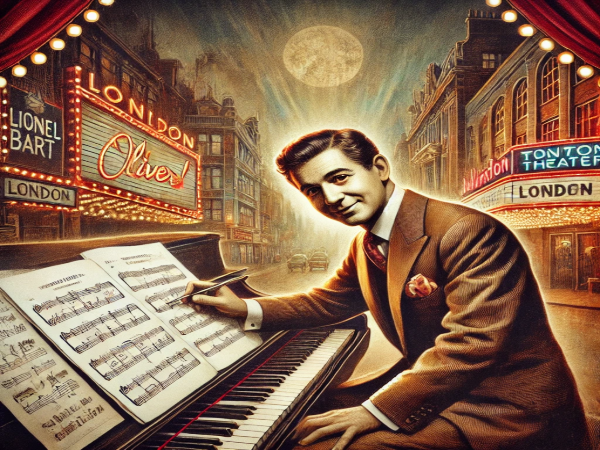Lionel Bart: The Genius Behind British Musicals
Exploring the Life, Legacy, and Impact of the Iconic Composer of Oliver!

Lionel Bart (1930-1999) was a renowned English composer and lyricist best known for his groundbreaking work in musical theatre, particularly for creating the beloved musical Oliver! in 1960. Bart’s innovative approach to the stage helped pave the way for the modern British musical. Despite facing personal and financial challenges, his work left an indelible mark on both the West End and Broadway. His notable contributions to pop music, collaborations with legends like Tommy Steele, and his collaborations with Joan Littlewood at Theatre Royal helped redefine the landscape of musical theatre during the 1960s.
Introduction: Who Was Lionel Bart?
Lionel Bart was a groundbreaking composer and lyricist who reshaped the landscape of British musical theatre. Born in East London on August 1, 1930, Bart’s early years were marked by adversity, but his inherent musical talent led him to a career that would forever influence the world of theatre. His most iconic work, Oliver!, premiered in 1960 and remains one of the most successful and cherished musicals in history. But Bart’s impact extended far beyond this one show—he was a major force in the development of British musical theatre, particularly during the 1960s, when American musicals had dominated London’s West End.
Lionel Bart’s Early Life and Family
Born Lionel Begleiter in Stepney, London, Bart came from a Jewish family, with his father working as a tailor. His early life was humble, marked by the challenges of growing up in a working-class family during wartime London. His passion for music developed early, and although he lacked formal music education, his talent was undeniable. Bart attended St Martin’s School of Art on a scholarship, but it was in the world of music where he found his true calling.
Bart’s family played a pivotal role in shaping his artistic vision. His parents, despite their modest means, encouraged his creativity, and Bart’s ability to compose music without formal training was both a testament to his natural talent and the influence of his upbringing.
Lionel Bart’s Career: A Rise to Fame
Bart’s musical career began with pop music in the 1950s, where he quickly became a sensation. His early success included writing songs for artists such as Tommy Steele and Cliff Richard. The hit “Living Doll” for Cliff Richard and “Rock with the Caveman” for Tommy Steele solidified Bart’s place in the British pop scene.
However, it was his shift towards musical theatre that marked the pinnacle of his career. Bart’s creation of Oliver! transformed the West End and set the stage for the 1960s revolution in British musical theatre. Unlike the American-dominated shows that had previously ruled the West End, Oliver! was entirely British, with its roots firmly embedded in British culture and society. The show’s success was groundbreaking, both commercially and artistically, and it earned Bart numerous accolades, including an Academy Award for Best Picture in 1968, when the film adaptation of Oliver! won the Oscar.
Lionel Bart and the Birth of Modern British Musical Theatre
In the 1960s, British musical theatre was undergoing a dramatic transformation. Bart played an instrumental role in this revolution, particularly through his collaborations with Joan Littlewood at Theatre Royal, Stratford East. His involvement with this theatre company helped redefine what a musical could be, blending traditional British storytelling with contemporary music and themes. Bart’s work in this period not only defined a new direction for musical theatre in Britain but also set the stage for future British composers, such as Andrew Lloyd Webber.
Oliver! became one of the most significant musicals in history, not only for its success in the West End but also for its lasting cultural impact. The show addressed societal issues, such as poverty and class disparity, and its characters—especially the orphaned protagonist, Oliver Twist—resonated with audiences worldwide. The musical’s innovative mix of drama, humor, and catchy songs remains a hallmark of Bart’s style.
Lionel Bart’s Age and Personal Life
Lionel Bart was born on August 1, 1930, and tragically passed away on April 3, 1999, at the age of 68. His death marked the end of an era in British musical theatre, as his works continued to be performed and admired long after his passing. Bart’s life was filled with both triumph and personal struggles, including financial difficulties and battles with substance abuse. Despite these challenges, he remains one of the most influential figures in the history of musical theatre.
Bart never married and did not have children, making his family life somewhat elusive. His legacy, however, lives on through his work, with Oliver! continuing to be performed globally, and his songs still resonating with audiences. While his personal life may have been marked by struggles, his professional achievements remain a source of inspiration for generations of theatre artists.
Lionel Bart’s Net Worth and Financial Challenges
Lionel Bart’s net worth during his lifetime was quite substantial, particularly after the success of Oliver!. His works were performed worldwide, and his musical was adapted into a successful film. However, despite his fame and fortune, Bart faced significant financial difficulties. In the 1970s, he found himself in a battle with debt, largely due to poor management and overspending during the peak of his career.
Despite his financial troubles, Bart’s work in musical theatre and his contributions to pop music ensured that he remained a prominent figure in British cultural history. His financial challenges did not overshadow the immense impact he had on the musical theatre world.
Lionel Bart’s Legacy and Influence on Musical Theatre
Lionel Bart’s legacy in the world of musical theatre is undeniable. As one of the first British composers to achieve international success, his influence can still be felt in the work of contemporary musical theatre artists. His unique ability to blend music with powerful storytelling set him apart from his peers. His contributions to British pop music and musical theatre paved the way for future generations of performers and composers.
Bart’s work also helped shape the modern British musical scene by proving that homegrown talent could succeed on the world stage. His innovative approach to songwriting and theatre production was revolutionary for its time and continues to inspire. Oliver! remains a timeless piece of theatre, and Bart’s influence continues to inspire musical theatre creators around the globe.
Lionel Bart’s Wiki: A Quick Overview
Lionel Bart’s life and career are chronicled in various biographies and articles. His journey from a working-class boy in London to a celebrated composer is one of resilience, creativity, and talent. His influence on the development of British musical theatre, particularly through works like Oliver!, made him one of the most significant figures in the industry. Though his personal life was marked by struggles, his professional achievements remain a testament to his extraordinary talent and vision.
Conclusion: The Enduring Impact of Lionel Bart
Lionel Bart’s contributions to music and theatre continue to have a lasting impact. He revolutionized British musical theatre, and his work remains a cornerstone of the West End. From Oliver! to his collaborations with other British artists, Bart’s legacy as a composer and lyricist is secure. Despite facing personal challenges, his creative genius ensured that his works would be celebrated for generations to come.
Lionel Bart’s story is one of triumph, talent, and transformation. His place in the annals of musical theatre history is firmly cemented, and his influence will continue to resonate in the world of theatre for many years to come.



